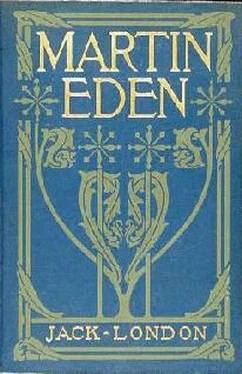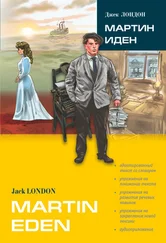The half hour he had with her, before they went in to dinner, left him supremely happy and supremely satisfied with life. Nevertheless, at table, the inevitable reaction and exhaustion consequent upon the hard day seized hold of him. He was aware that his eyes were tired and that he was irritable. He remembered it was at this table, at which he now sneered and was so often bored, that he had first eaten with civilized beings in what he had imagined was an atmosphere of high culture and refinement. He caught a glimpse of that pathetic figure of him, so long ago, a self-conscious savage, sprouting sweat at every pore in an agony of apprehension, puzzled by the bewildering minutiae of eating-implements, tortured by the ogre of a servant, striving at a leap to live at such dizzy social altitude, and deciding in the end to be frankly himself, pretending no knowledge and no polish he did not possess.
He glanced at Ruth for reassurance, much in the same manner that a passenger, with sudden panic thought of possible shipwreck, will strive to locate the life preservers. Well, that much had come out of it-love and Ruth. All the rest had failed to stand the test of the books. But Ruth and love had stood the test; for them he found a biological sanction. Love was the most exalted expression of life. Nature had been busy designing him, as she had been busy with all normal men, for the purpose of loving. She had spent ten thousand centuries-ay, a hundred thousand and a million centuries-upon the task, and he was the best she could do. She had made love the strongest thing in him, increased its power a myriad per cent with her gift of imagination, and sent him forth into the ephemera to thrill and melt and mate. His hand sought Ruth’s hand beside him hidden by the table, and a warm pressure was given and received. She looked at him a swift instant, and her eyes were radiant and melting. So were his in the thrill that pervaded him; nor did he realize how much that was radiant and melting in her eyes had been aroused by what she had seen in his.
Across the table from him, cater-cornered, at Mr. Morse’s right, sat Judge Blount, a local superior court judge. Martin had met him a number of times and had failed to like him. He and Ruth’s father were discussing labor union politics, the local situation, and socialism, and Mr. Morse was endeavoring to twit Martin on the latter topic. At last Judge Blount looked across the table with benignant and fatherly pity. Martin smiled to himself.
"You’ll grow out of it, young man," he said soothingly. "Time is the best cure for such youthful distempers." He turned to Mr. Morse. "I do not believe discussion is good in such cases. It makes the patient obstinate."
"That is true," the other assented gravely. "But it is well to warn the patient occasionally of his condition."
Martin laughed merrily, but it was with an effort. The day had been too long, the day’s effort too intense, and he was deep in the throes of the reaction.
"Undoubtedly you are both excellent doctors," he said; "but if you care a whit for the opinion of the patient, let him tell you that you are poor diagnosticians. In fact, you are both suffering from the disease you think you find in me. As for me, I am immune. The socialist philosophy that riots half-baked in your veins has passed me by."
"Clever, clever," murmured the judge. "An excellent ruse in controversy, to reverse positions."
"Out of your mouth." Martin’s eyes were sparkling, but he kept control of himself. "You see, Judge, I’ve heard your campaign speeches. By some henidical process-henidical, by the way is a favorite word of mine which nobody understands-by some henidical process you persuade yourself that you believe in the competitive system and the survival of the strong, and at the same time you indorse with might and main all sorts of measures to shear the strength from the strong."
"My young man-"
"Remember, I’ve heard your campaign speeches," Martin warned. "It’s on record, your position on interstate commerce regulation, on regulation of the railway trust and Standard Oil, on the conservation of the forests, on a thousand and one restrictive measures that are nothing else than socialistic."
"Do you mean to tell me that you do not believe in regulating these various outrageous exercises of power?"
"That’s not the point. I mean to tell you that you are a poor diagnostician. I mean to tell you that I am not suffering from the microbe of socialism. I mean to tell you that it is you who are suffering from the emasculating ravages of that same microbe. As for me, I am an inveterate opponent of socialism just as I am an inveterate opponent of your own mongrel democracy that is nothing else than pseudo-socialism masquerading under a garb of words that will not stand the test of the dictionary."
"I am a reactionary-so complete a reactionary that my position is incomprehensible to you who live in a veiled lie of social organization and whose sight is not keen enough to pierce the veil. You make believe that you believe in the survival of the strong and the rule of the strong. I believe. That is the difference. When I was a trifle younger,-a few months younger,-I believed the same thing. You see, the ideas of you and yours had impressed me. But merchants and traders are cowardly rulers at best; they grunt and grub all their days in the trough of money-getting, and I have swung back to aristocracy, if you please. I am the only individualist in this room. I look to the state for nothing. I look only to the strong man, the man on horseback, to save the state from its own rotten futility."
"Nietzsche was right. I won’t take the time to tell you who Nietzsche was, but he was right. The world belongs to the strong-to the strong who are noble as well and who do not wallow in the swine-trough of trade and exchange. The world belongs to the true nobleman, to the great blond beasts, to the noncompromisers, to the ‘yes-sayers.’ And they will eat you up, you socialists-who are afraid of socialism and who think yourselves individualists. Your slave-morality of the meek and lowly will never save you.-Oh, it’s all Greek, I know, and I won’t bother you any more with it. But remember one thing. There aren’t half a dozen individualists in Oakland, but Martin Eden is one of them."
He signified that he was done with the discussion, and turned to Ruth.
"I’m wrought up to-day," he said in an undertone. "All I want to do is to love, not talk."
He ignored Mr. Morse, who said:-
"I am unconvinced. All socialists are Jesuits. That is the way to tell them."
"We’ll make a good Republican out of you yet," said Judge Blount.
"The man on horseback will arrive before that time," Martin retorted with good humor, and returned to Ruth.
But Mr. Morse was not content. He did not like the laziness and the disinclination for sober, legitimate work of this prospective son-in-law of his, for whose ideas he had no respect and of whose nature he had no understanding. So he turned the conversation to Herbert Spencer. Judge Blount ably seconded him, and Martin, whose ears had pricked at the first mention of the philosopher’s name, listened to the judge enunciate a grave and complacent diatribe against Spencer. From time to time Mr. Morse glanced at Martin, as much as to say, "There, my boy, you see."
"Chattering daws," Martin muttered under his breath, and went on talking with Ruth and Arthur.
But the long day and the "real dirt" of the night before were telling upon him; and, besides, still in his burnt mind was what had made him angry when he read it on the car.
"What is the matter?" Ruth asked suddenly alarmed by the effort he was making to contain himself.
"There is no god but the Unknowable, and Herbert Spencer is its prophet," Judge Blount was saying at that moment.
Читать дальше












